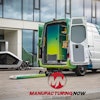I have a secret. I have fallen in love… with a conference. I know that sounds a bit silly, but I recently attended one of the best conferences of my career and it left me a little effusive.
The Economist Conference on Innovation held at UC Berkley, put on by the same folks behind that terrific magazine, was smart and engaging, and boasted an utterly impressive list of presenters and panelists.
The good vibes (we were in California, after all) started off with an introduction from Vijay Vaitheeswaran, China business editor for "The Economist" and author of Need Speed Greed. Vaitheeswaran set the pace for the day by declaring that the word innovation is the most overused and abused word in society today. This was music to my ears, and likely to many others in the room. As those who truly innovate know, the term innovation has almost lost its meaning, because it has been hijacked and abused by companies that do nothing of the sort.
Vaitheeswaran then defined the word as it would be used in discussion for the remainder of the day. What a concept? Defining a broad term and the context in which it was going to be used during a specific conference. Was it too early for a standing ovation? If you read my article from the Co Dev/Oi Summit, you will remember me describing how confused an entire audience was on the concept of Open Innovation.
Vaitheeswaran understood that everyone brings their own unique understanding of innovation to the table, so it was important to define the term and create a context for the discussions to come. Brilliant. He defined innovation as “fresh thinking that creates value.” Clear, concise, to the point. This set the tone, and it put each person in the audience on the same page. Let the fun begin.
First up, a panel discussion on how to build a culture of innovation for the 21st century, and perhaps even save the plant along the way (no small task). The panel included: Stewart Brand, president of The Long Now Foundation; Joseph Nye, distinguished service professor for John F. Kennedy School of Government at Harvard University; Laura Tyson, professor at Haas School of Business, University of California Berkeley; Naveen Jain, founder of The World Innovation Institute; and Daniel Franklin, executive editor of "The Economist" and editor for The World. How about that for some talent in the room? It was a lively discussion filled with hope, but tempered with the reality that if we don’t start trying to work together nothing will get accomplished.
Perhaps the most innovative part of the conference, though, was not what happened, but what didn’t happen. Not one attendee was subjected to a death by PowerPoint. During one 30 minute segment, a Pecha Kucha style of presentation was given. In Pecha Kucha, the presenters were given 20 slides and could only spend 20 seconds on each slide.
This fast paced style forces a presenter to have a clear and concise idea of what they are going to present, and sometimes requires them to speed up quite a bit at the end, which can lead to some funny, breathless moments. If we all conducted our meetings this way we might all get a lot more accomplished.
The Pecha Kucha presentations were given by six people, including Andras Forgacs, co-founder of Organovo; Andie Grace, communications and regional network manager of Burning Man; Colleen McCreary, chief people officer for Zynga; Kalimah Priforce, founder of Qeyno Labs; Jason Silva, co-founding host of Current TV; and James Syhabout, executive chef for Commis. Each of these speakers brought his or her own perspective on how to create and inspire innovation; through human capital, ambition, education, or simply passion to do the unknown. It was a lively and thought-provoking presentation, and all before lunch.
In fact, the entire day was a series of enlightening moments, rounded out with a powerful final presentation -- a debate on whether or not America is winning the innovation race. Defending the motion were Vivek Wadhwa, vice-president of Academics and Innovation at Singularity University; and Haiyan Wang, founder and managing partner of China India Institute. Against the motion were Andrew Chung, partner in Khosla Ventures; and Ann Lee, author of “What the U.S. Can Learn From China.” It was heated and loud and a truly unique way to end the day, with Wadhwa and Wang emerging victorious, but only by a narrow margin of audience hands.
I want my entire company to attend this conference next year. The topics and panelists are engaging and witty, and let’s not forget brilliant. More importantly, I left feeling inspired and hopeful for America and for the world, a rare takeaway from any conference. The list of attendees included everyone from students to pharmaceutical executives to real estate moguls, and there was something for everyone to learn. If you’re interested in learning more “fresh ideas that create value,” you can see footage from the event at https://events.economist.com/blog/trending/videos_how-fast-can-we-grow-vital-questions-for-america-europe-and-greece/.






















